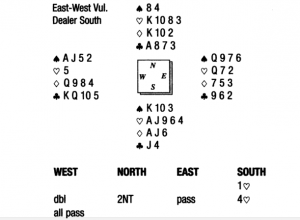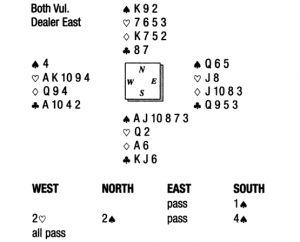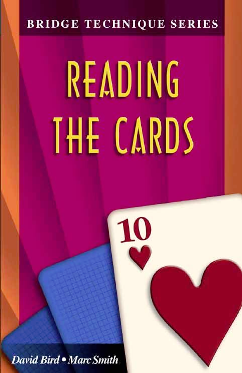Source: Reading the Cards By David Bird, Marc Smith

The basis of all problem solving is processing the data to arrive at a logical conclusion. One of the great novelties, and attractions, of bridge is that the data is not all visible. During the bidding you can see only thirteen of the fifty-two cards. You gather further pieces of data by listening to the bids from around the table. When the dummy goes down you can see another thirteen cards and gradually — as each card is played — you gather further information about the hand. To become a good dummy player, and defender, you must cultivate two main skills. You must read how the cards lie, to gain the data you need. You must then process the information logically, calculating which line of play or defense is most likely to succeed.
Clues From the Bidding

Playing a contract is always easier if the opponents entered the bidding. Suppose you are sitting South, playing in 4![]() , and West opened the bidding with a 3
, and West opened the bidding with a 3![]() preempt. Immediately you can place him with a likely seven-card heart suit. Suppose his opening lead is the king of hearts. It is now unlikely that he holds a side-suit singleton: he would probably have led such a card. Already you are inclined to place West with 1-7-3-2, 1-7-2-3, or 2-7-2-2 shape. After a few more tricks, you will have a complete map of his hand. You will know also that he is unlikely to hold any missing high cards outside his own suit. Such knowledge will greatly assist you in playing the hand. Let’s look straight away at a full deal where your line of play is affected by the auction,
preempt. Immediately you can place him with a likely seven-card heart suit. Suppose his opening lead is the king of hearts. It is now unlikely that he holds a side-suit singleton: he would probably have led such a card. Already you are inclined to place West with 1-7-3-2, 1-7-2-3, or 2-7-2-2 shape. After a few more tricks, you will have a complete map of his hand. You will know also that he is unlikely to hold any missing high cards outside his own suit. Such knowledge will greatly assist you in playing the hand. Let’s look straight away at a full deal where your line of play is affected by the auction,

West leads the ![]() K. How should you play this heart game?
K. How should you play this heart game?
Look at the trump suit first. Missing the queen, with a combined holding of nine cards, you would normally play for the drop. However, there are not many high-card points missing, which suggests that West is likely to hold a classic shape for his vulnerable take-out double — i.e. he will be short in hearts. This is enough to tilt the odds in favor of a finesse through the East hand.
You win the club lead with dummy’s ace, play the king of trumps, and continue with a low trump to the jack. West shows out. Yes! You draw the last trump and must now decide how to play the diamond suit. Which defender is more likely to hold the ![]() Q, would you say?
Q, would you say?
There are two reasons why West is a favorite to hold the diamond queen. Firstly, he held only one heart to his partner’s three. He therefore has more space left to accommodate cards in the other three suits. Secondly, he will also hold most of the defenders’ points. Even if you expected West and East to hold roughly the same number of diamonds, West would be more likely to hold any missing honor.
So, you cash the ace of diamonds and lead a low diamond to the ten. Once again the evidence from the bidding does not let you down. The finesse is successful and you make your game. Here is a similar deal, where a defender has overcalled. If you feel up to a test, cover the defenders’ cards and take over from South.

Yes, 4![]() was an overbid. Still the game has some play. West begins the defense by playing the king, ace and ten of hearts, East discarding a club. How would you play the contract?
was an overbid. Still the game has some play. West begins the defense by playing the king, ace and ten of hearts, East discarding a club. How would you play the contract?
You ruff the third round of hearts and see that you can afford only one loser in the club suit. You cross to the king of diamonds and lead a club, East following low. Which defender is more likely to hold the ![]() A, would you say? It is West, because he is the player who entered the bidding. As he made a vulnerable two-level overcall on a five-card suit, he is a strong favorite to hold the ace of clubs. You therefore play the club jack from hand and are pleased to see this draw the ace. When West persists with a fourth round of hearts, East throws another club and you ruff in the South hand. What now?
A, would you say? It is West, because he is the player who entered the bidding. As he made a vulnerable two-level overcall on a five-card suit, he is a strong favorite to hold the ace of clubs. You therefore play the club jack from hand and are pleased to see this draw the ace. When West persists with a fourth round of hearts, East throws another club and you ruff in the South hand. What now?
You play the ![]() K, drawing the queen from East, and lead a third club. East surely has no more clubs and you must decide whether to ruff your last loser with the nine or the king. The choice depends on which defender you think is more likely to hold the queen of trumps. What what would your decision be?
K, drawing the queen from East, and lead a third club. East surely has no more clubs and you must decide whether to ruff your last loser with the nine or the king. The choice depends on which defender you think is more likely to hold the queen of trumps. What what would your decision be?
West has shown up with nine cards in hearts and clubs, East with only six. Since East has seven spaces remaining to West’s four, he is more likely to hold spade length and, therefore, the spade queen. You ruff with the king and lead the ![]() 9. When East follows with a low card, you underplay with your eight, leaving the lead in dummy. You repeat the trump finesse, draw East’s last trump, and claim. Another success for overbidding!
9. When East follows with a low card, you underplay with your eight, leaving the lead in dummy. You repeat the trump finesse, draw East’s last trump, and claim. Another success for overbidding!
When an opponent has opened INT, you will have a very accurate picture, both of his points and his approximate shape. The best line of play on the next deal is made clear by West’s opening bid. Try your skill as declarer by covering the East-West cards.

North knows that you are a fine dummy player but, even so, his leap to the spade game is a marked overbid. West leads ace, king and another club to his partner’s queen. Back comes the ![]() 10. How will you play the hand? The North and South hands hold 22 points between them, leaving 18 points for the defenders. West’s opening bid promised at least 15 points, leaving at most 3 points for East. Since he has already shown up with the
10. How will you play the hand? The North and South hands hold 22 points between them, leaving 18 points for the defenders. West’s opening bid promised at least 15 points, leaving at most 3 points for East. Since he has already shown up with the ![]() Q, the only other honor that East can hold is the jack of diamonds. A trump finesse is doomed to fail, so you will have to play to drop West’s queen doubleton. Even if you get lucky in that direction, you will still be one trick short. How about winning the trump switch with dummy’s king and finessing the
Q, the only other honor that East can hold is the jack of diamonds. A trump finesse is doomed to fail, so you will have to play to drop West’s queen doubleton. Even if you get lucky in that direction, you will still be one trick short. How about winning the trump switch with dummy’s king and finessing the ![]() J? Once again, you know from the bidding that such a finesse is certain to lose. Can you see any other chance?
J? Once again, you know from the bidding that such a finesse is certain to lose. Can you see any other chance?
If West holds four hearts, he can be caught in a simple squeeze. You win the trump switch with the king and cross to the ace of trumps, pleased to see the queen fall on your left. After drawing the last trump, you play the ace and king of hearts, then ruff a bean. When you run your remaining trumps, West will have no good discard on the last round. As West has to discard before the dummy, you can wait and see what he throws before pitching from dummy. If he releases his ![]() Q, dummy’s
Q, dummy’s ![]() 8 will score. If instead he bares the
8 will score. If instead he bares the ![]() K, you will make two diamond tricks.
K, you will make two diamond tricks.


